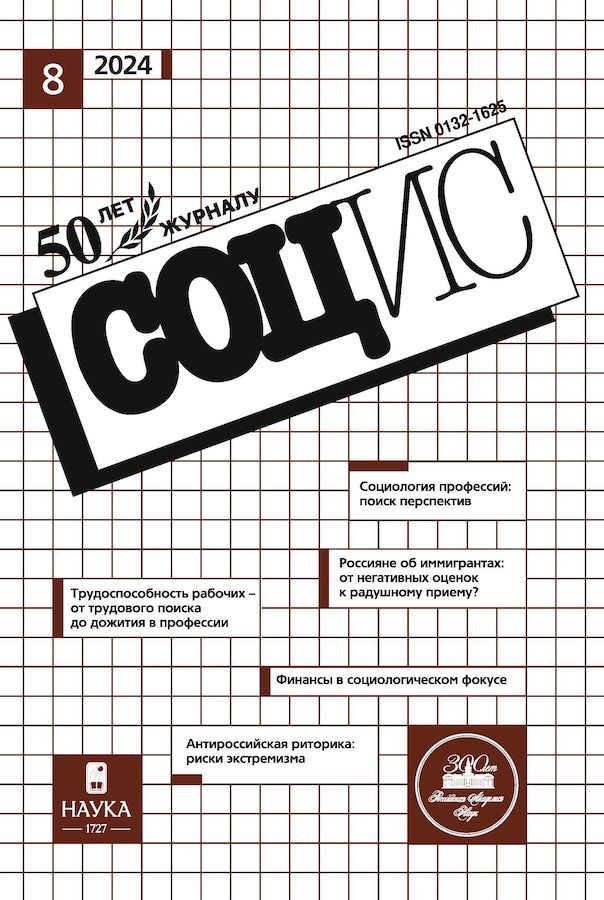Labor biographies of russian workers: from search to survival
- Авторлар: Andreeva Y.V.1, Lukyanova E.L.1
-
Мекемелер:
- Ulyanovsk State University
- Шығарылым: № 8 (2024)
- Беттер: 37-48
- Бөлім: ECONOMIC SOCIOLOGY. SOCIOLOGY OF LABOR
- URL: https://clinpractice.ru/0132-1625/article/view/661792
- DOI: https://doi.org/10.31857/S0132162524080035
- ID: 661792
Дәйексөз келтіру
Аннотация
The article aims to study labor biography of industrial workers. It is based on the materials of in-depth interviews conducted in the Ulyanovsk region in 2020–2021. The authors propose a new approach to the study of labor biographies, taking the concept of work capacity. They distinguish three main stages: labor search, labor balance and labor survival. This division is based on the logic of workers building their own professional path, therefore, considering stages do not have certain age or time limits. The authors give main characteristic of the worker’s behavior for each of this stage. The purpose of labor search is to choose such type of employment or working conditions that would suit the physical capabilities, personality and salary expectations of the worker, as well as their ability to learn new professional skills. The stage of labor balance is characterized by achieving a balance between different types of employment that allows workers to cope with high physical exertion and provide the desired standard of living. The stage of labor survival is aimed at preserving the workplace, adapting the labor process to the current state of health and reduced physical capabilities. The authors emphasize that the work capacity (in the form of health, professional experience and knowledge) is not the resources that are valued by both employers and workers. As a consequence, the stages of labor search and balance can quite quickly be replaced by the stage of labor survival.
Негізгі сөздер
Толық мәтін
Авторлар туралы
Yulija Andreeva
Ulyanovsk State University
Хат алмасуға жауапты Автор.
Email: yulia.andre@gmail.com
Cand. Sci. (Ps.), Assoc. Prof.
Ресей, UlyanovskEvgeniya Lukyanova
Ulyanovsk State University
Email: lukyanova.jenya@gmail.com
Lecturer
Ресей, UlyanovskӘдебиет тізімі
- Андреева Ю. В., Лукьянова Е. Л. Рабочий класс в России: поиск новых векторов дифференциации // Социологические исследования. 2018. № 10. С. 54–65.
- Димке Д., Карюхина И. Поселок городского типа: временные ритмы деурбанизированного сообщества // Социология власти. 2013. № 3(2013). С. 73–93.
- Игнатова С. Н. Трудовая биография как объект исследования // Социологический журнал. 2016. Т. 22. № 4. С. 60–73.
- Константиновский Д. Л., Вознесенская Е. Д., Чередниченко Г. А. Рабочая молодежь сегодня: образование, профессия, социальное самочувствие // Социологическая наука и социальная практики. 2013. № 2. С. 21–38.
- Лукьянова Е. Л. Роль профессиональных компетенций в трудовых стратегиях работников // Трудовые ценности молодежи инновационного региона. Ульяновск: УлГУ, 2020. С. 9–42.
- Макарова М. Н. Стратегии воспроизводства рабочих как отражение их трудовых и образовательных ориентаций // Социологические исследования. 2007. № 8. С. 58–65.
- Попова И. П. Этапы профессиональной карьеры и биографии ученых: перспективы исследования // (Авто)биография как объект социологического анализа. Мат. Х чт. памяти В. Б. Голофаста / Под ред. О. Б. Божкова. СПб.: Норма, 2018. C. 171–180.
- Тартаковская И. Н. Карьера рабочего как биографический выбор // Социальная мобильность в России: поколенческий аспект / Отв. ред. В. В. Семёнова, М. Ф. Черныш, А. В. Ваньке. М.: ИС РАН, 2017. С. 119–137.
- Morris J. Notes on the “Worthless Dowry” of Soviet Industrial Modernity: Making Working-Class Russia Habitable // Laboratorium. 2015. No. 7(3). P. 25–48.
- Статья поступила: 10.06.24. Финальная версия: 16.07.24. Принята к публикации: 12.08.24.
- REFERENCES
- Andreeva Ju.V., Lukyanova E. L. (2018) Working Class in Search of New Dimensions of Differentiation. Sotsiologicheskie issledovaniya [Sociological Studies]. No. 10: 54–65. (In Russ.)
- Dimke D., Koryuhina I. (2013) Urban Settlement: Temporary Rhythms of a Deurbanized Community. Sociologiya vlasti [Sociology of Power]. No. 3: 73–93. (In Russ.)
- Ignatova S. N. (2016) Work History as a Subject of Research. Sociologicheskii zhurnal [Russian Sociological Journal]. Vol. 22. No. 4: 60–73. (In Russ.)
- Konstantinovskii E. D., Voznesenskaya G. A., Cherednichenko (2013) Young Workers Today: Education, Profession, Social Health. Sociologicheskaja nauka i social’naja praktika [Social Science and Social Practice]. No. 2: 21–38. (In Russ.)
- Lukyanova E. (2020) The Role of Professional Skills in the Labor Strategies of Employees. In: Labor Values of the Youth in the Innovative Region. Ulyanovsk: UlGU: 9–42. (In Russ.)
- Makarova M. N. (2007) Workers’ Production Strategies as a Reflection of Their Labor and Educational Orientations. Sotsiologicheskie issledovanie [Sociological Studies]. No. 8: 58–65. (In Russ.)
- Morris J. (2015) Notes on the “Worthless Dowry” of Soviet Industrial Modernity: Making Working-Class Russia Habitable. Laboratorium. No. 7(3): 25–48.
- Popova I. P. (2018) Stages of Professional Career and Biographies of Scientists: Research Prospects. In: (Auto)biography as an Object of Sociological Analysis. Mat. of the X readings in memory of V. B. Golofast. Ed. by O. B. Bozhko. Ed. St. Petersburg: Norma: 171–180. (In Russ.)
- Tartakovskaya I. N. (2017) Working-Class Career as Choice Biography. In: Social mobility in Russia: Generational aspect. Ed. by V. V. Semenova, M. F. Chernish, A. V. Vanke. Moscow: IS RAN: 119–137. (In Russ.)
Қосымша файлдар









